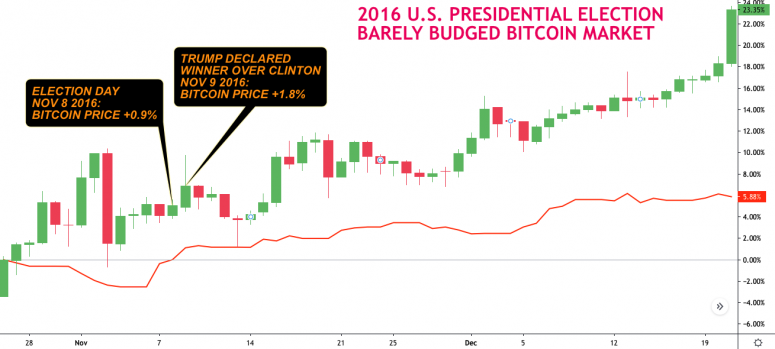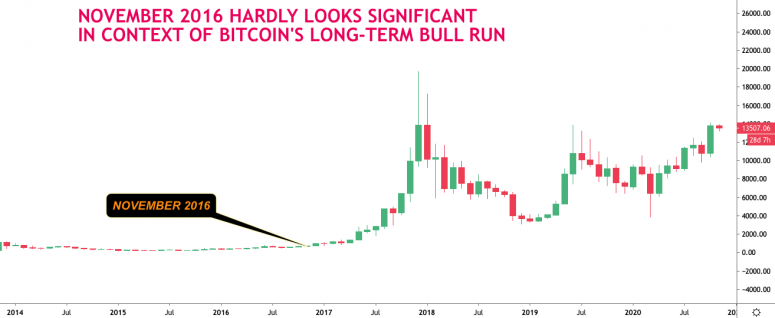
ND (21:20 ET): Cynthia Lummis just won her race for a Senate seat representing Wyoming. This isn’t a surprise – she was clearly favored in the polls once she won her primary race this past summer – and there’s a lot of hope from the crypto industry that she’ll be a hardcore advocate for the space.
BK (21:15): CNN projects Connecticut for Biden, South Dakota for Trump. No surprise.
BK (21:13): CNN making point that Ohio and North Carolina both leaning blue at the moment, could spell trouble for Trump if those hold.
SS (21:09): In the last two hours predictions markets have begun to narrow: Biden at 55% to Trump’s 45%. Next key battleground state, assuming Trump takes for Florida, is Arizona where bettors have flipped Republican in past hour.
BK (21:05 ET): CNN projects New Jersey for Biden, Arkansas for Trump. No surprise.
BK (20:53 ET): Next big slug of polls close in 7 minutes.
SS (20:40 ET): Crypto predictions platform Polymarket is beginning to flash some interesting results. According to the platform, there is now a 93% chance Trump takes Florida, with predictions paying $0.93 to the Republicans and $0.70 for the Democrats.
“Two stand outs: Pennsylvania is leaning to the Democrats while Texas is leaning heavily to Republicans with 85%,” said Shayne Coplan, founder and CEO of Polymarket.
Other crypto predictions markets are struggling to keep pace as predictit.org and electionbettingodds.com have gone dark. Another interesting prediction is “will Donald Trump tweet announcing that he won the election before November 5th 2020?” Currently 55% of respondent are betting that is unlikely, though the margins are close.
ND (20:40 ET): So far, Rep. Darren Soto (D-Fla.) and Senators Tom Cotton (R-Ark.) and Mark Warner (D-Va.) have won re-election, to no surprise. Soto is perhaps the most enthusiastic about blockchain of the three, introducing a number of bills aimed at integrating blockchain with government efforts. Warner is more of a Libra skeptic, while Cotton believes the U.S. should create a central bank digital currency to prevent China from displacing the dollar as the world reserve currency.
ND (20:35 ET): PredictIt is still down.
ND: Hello CoinDesk readers and welcome to our live coverage of the 2020 election results. Today Nikhilesh De, Bradley Keoun, Sandali Handagama and Sebastian Sinclair will be bringing you real-time updates as the elections are called for lawmakers important to our industry, as well as keeping you up to speed on what the prediction and futures markets are saying.
We’ll be tracking the price of Bitcoin through the night to see if traders are also watching this election or if any particular outcomes have an impact on movement.

Bitcoin’s price did not react at all to the 2016 election, rising a scant 1.8 percent in the 24-hour trading period, and given the crypto industry’s overall lack of engagement in this election, there’s no reason to believe this might change in 2020.

Of course, it is worth noting that Bitcoin embarked on the famous 2017 bull run just months after the election, rising to all-time highs close to $20,000 within a year and giving birth to an initial coin offering boom that regulators are still investigating and conducting enforcement actions against nearly three years later. At the moment, Bitcoin is slowly rising, hitting a nearly two-year high of $14,000 just the other day. And since the last election, its price has grown 19-fold.

Still, comparing the crypto industry now to the industry in 2016 would be foolish at best. The market has matured in many ways, with the U.S. space at least seeing the introduction of futures contracts and a greater number of regulated entities. Regulators have likewise gained a better understanding of the space, introducing new regulations or clarifying how cryptocurrencies fit into existing frameworks – to an extent.
The winners of this year’s election will get to decide how regulators are to proceed and whether new legislation is passed. CoinDesk will be here providing updates to watch it all unfold.
